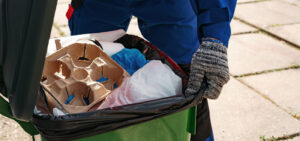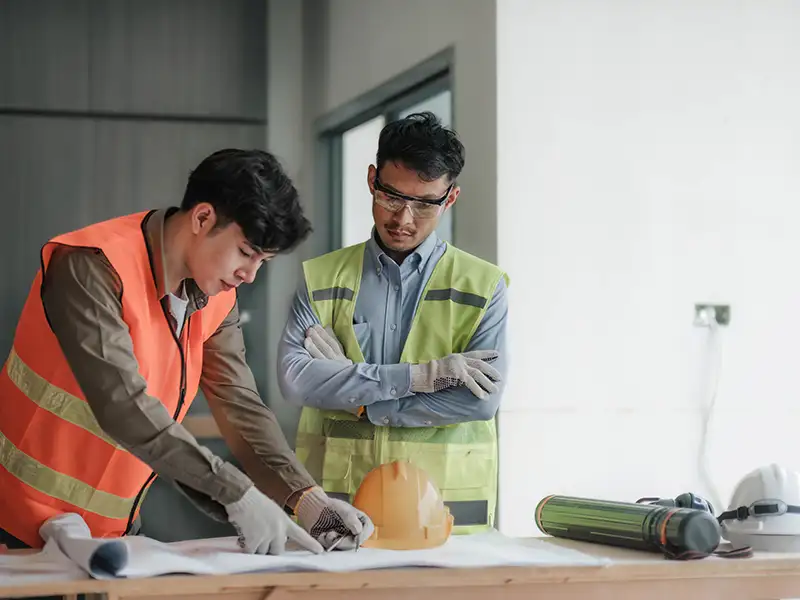In the heart of Alabama, janitors, cleaners and housekeepers tirelessly maintain the cleanliness and safety of our offices, schools, hotels and hospitals. Their roles are fundamental to the day-to-day operations of many establishments, yet, like many physically demanding jobs, their tasks come with an array of risks.
While the challenges they face are numerous, there are also many options available for financial assistance if and when they suffer an injury or illness at work, providing a safety net in times of unexpected hardship.
This article will explain your rights if you’ve been injured while working in these professions, as well as the steps to file a workers’ compensation claim in Alabama for medical benefits and lost wages.
Injury statistics for janitors and cleaners
According to the U.S. Bureau of Labor Statistics (BLS) , there are 1.9 million people working in the cleaning industry. This figure excludes housekeepers and maids but includes janitors, custodians and cleaners.
There are many occupational hazards in the industry. From toxic fumes to slippery or cluttered floors, janitors can find themselves sick, hurt, disabled, or even killed because of their duties.
In 2020 alone, there were 21,100 cases of janitors suffering non-fatal injuries and illnesses that required time off work. There were also 42 cases where these work-related injuries or illnesses resulted in deaths.
The most common injuries for janitors reported by the BLS were sprains, strains and tears, accounting for 6,130 cases.
The most prevalent cause of injury was exposure to harmful environments or substances, which led to 4,740 injuries in 2020. Other risks included the following:
- Falls (4,720 injuries)
- Being struck by equipment (1,880 injuries)
- Being struck against equipment (1,790 injuries)
- Overexertion (1,460 injuries)
Pennsylvania shuttle case
In 2021, a janitor in Pennsylvania was injured by a fall from a shuttle on his way to work. He was originally denied workers’ comp because of the “coming and going” rule, which doesn’t cover injuries sustained when an employee is traveling to and from work. However, since he had already arrived at the work site when he exited the shuttle and fell, the denial was overturned later.
Los Angeles stabbing case
In 2021, a janitor at a Los Angeles apartment building was fatally stabbed while protecting a female tenant from her boyfriend. His tragic death serves as an example of how janitors can face all types of dangers on the job, including unexpected ones.
Kentucky COVID-19 case
In 2020, a janitor in Kentucky died from COVID-19 after being exposed to the virus during the course of his duties at a middle school. Filing for workers’ compensation because of COVID-19 is an ongoing legal battle that every state handles differently.
Common job hazards and injuries for janitors and cleaners
Janitors, housekeepers, and cleaners play a vital role in maintaining cleanliness and hygiene in various settings, including offices, hotels, hospitals and schools. While their risks differ slightly based on their specific work environment, here’s a breakdown of some of the most common job hazards and resulting injuries for these workers:
- Slip, trip, and fall hazards include wet floors, cluttered areas, uneven surfaces, loose carpets and poor lighting. Slip-and-fall accidents often result in injuries like sprains, strains, fractures, head injuries and contusions.
- Chemical exposure hazards include the use of cleaning agents, detergents, disinfectants and solvents. The resulting injuries include burns, respiratory problems, eye problems and allergic reactions.
- Electrical hazards can result from electrical equipment, frayed cords, or working near live wires, leading to injuries like electrocutions, burns and internal organ damage.
- Violence is a hazard that can result from interactions with coworkers or the public. Janitors who work in hospitals, hotels and schools are especially at risk for these events. Injuries can include head trauma, broken bones and serious and life-threatening wounds from guns, knives and other weapons.
- Falling object hazards often result from items stored improperly on high shelves or in overfilled storage areas. The resulting injuries can include traumatic brain injuries, fractures and spinal cord injuries.
- Burn hazards can result from chemicals but also occur from contact with hot surfaces, steam or the use of hot water. Injuries most often include first-, second- or third-degree burns, some of which require significant medical treatment.
- Overexertion hazards are many and may include lifting heavy trash bags, pushing heavy carts, or moving large pieces of furniture. These often result in overexertion injuries like hernias and muscle or tendon strains and sprains, including back injuries.
- Respiratory hazards include inadequate ventilation and exposure to dust, aerosol sprays and chemicals. Exposure to these hazards can lead to respiratory distress and difficulty breathing.
- Equipment hazards result whenever workers must work with or around heavy equipment. They risk getting struck by moving parts or getting injured when equipment hasn’t been properly stored or maintained. Injuries can include broken bones, internal organ damage and amputations.
- Cut and abrasion hazards include handling broken glass or sharp objects and using cutting tools. Injuries include lacerations, puncture wounds and abrasions.
To minimize these risks, it’s essential for janitors, housekeepers, and cleaners to receive proper training, use appropriate personal protective equipment (PPE), and be familiar with the safety procedures and guidelines of their workplace. Additionally, employers should ensure that these workers have access to safe tools and equipment, as well as a safe working environment.
The consequences of inadequate training in the workplace
Learn why worker training benefits both employers and workers alike
Occupational illnesses and diseases among janitors and cleaners
Occupational illnesses and diseases refer to health conditions resulting from exposure to environmental factors or specific conditions in the workplace. Unlike sudden injuries or accidents, these illnesses often develop over a period of time due to consistent exposure to certain harmful substances or repetitive actions related to a specific job.
Janitors and cleaners, given the nature of their work, are particularly susceptible to several occupational diseases because of their frequent interaction with various chemicals, biological agents and repetitive tasks.
Some of the common occupational illnesses and diseases experienced by janitors include:
- Respiratory illnesses. Occupational diseases like cancer and asthma can be caused by inhaling chemicals, dust, mold or other particulates present in cleaning products or the environment.
- Dermatological issues. Chronic skin conditions like contact dermatitis can result from direct contact with harsh cleaning chemicals or allergens over time.
- Repetitive strain injuries (RSIs). Conditions like carpal tunnel syndrome or tendonitis can result from repetitive actions, such as scrubbing or mopping.
- Hearing loss. Prolonged exposure to loud machinery or equipment, such as vacuum cleaners or floor polishers, may cause permanent hearing loss.
- Infectious diseases. As janitors often come into contact with waste or used materials, they can be at risk of contracting illnesses from harmful bacteria or pathogens. They can also be at an increased risk of exposure to illnesses and viruses from the community (like COVID-19) if they work in health care settings, hotels or schools.
The good news is that workers’ compensation covers both occupational illnesses and traumatic work injuries.
How workers’ compensation works in Alabama
If you’ve been hurt through janitorial or cleaning work, you might be entitled to workers’ compensation in Alabama. This is a special type of insurance that employers must purchase to cover their employees if they become injured or ill at work.
In Alabama, every business with 5 or more employees is required by law to have workers’ compensation insurance.
However, there are exceptions for certain types of businesses that employ workers in the agriculture and construction industries. There’s also an exception for “domestic” employees, such as housekeepers, which can impact those in the cleaning industry.
Attorney Bernard Nomberg explains how to determine whether a worker
is an employee or an independent contractor in Alabama.
Another thing to consider is whether you’re legally classified as an employee or an independent contractor. Independent contractors aren’t covered by workplace protections like workers’ comp.
To check and see if your employer carries workers’ compensation insurance, you can use this online verification tool provided by the Alabama Department of Labor. If you need help determining your status as an employee or your eligibility for workers’ comp benefits, contact an Alabama workers’ compensation attorney who can explain your rights.
What is no-fault workers’ comp insurance?
Worker’s compensation is considered “no-fault” insurance, meaning that no one has to be at fault for your illness or injury for you to be compensated. This protects both employers and employees from having to assume liability for an accident.
By contrast, if you wanted to file a personal injury lawsuit after a work injury, you’d need to prove that someone else’s negligence was the cause of your injury.
What this ultimately means is that an eligible employee is entitled to workers’ comp benefits after an on-the-job injury even if they caused the accident that led to it—as long as the injury wasn’t intentional.
Types of workers’ comp benefits
Depending on the severity of your injury or illness, you might be entitled to several types of workers’ compensation benefits, including:
- Medical benefits. These include payments for hospital stays, doctor appointments, treatments, surgeries, medications, rehabilitation services, and more.
- Lost wage benefits. These are payments to replace your income if you’re unable to work during your recovery and are usually two-thirds of your average weekly salary.
- Death benefits. These are provided for a loved one if you die from your injury or illness and include funeral expenses and lost income.
Please note that workers’ comp doesn’t usually cover pain and suffering.
Steps for filing a workers’ compensation claim in Alabama
Every state has its own process for workers needing to file a workers’ comp claim. In Alabama, it looks like this:
- Seek medical attention. See a doctor as soon as possible to prevent your injury from getting worse and to obtain documentation that it was caused by your job. In non-emergency situations, you’ll need to see a doctor approved by your employer for the visit to be covered under workers’ comp.
- Notify your employer of your injury. This should be done within 5 days and in writing. In some cases, you may have up to 90 days to report your injury, but it should be done as soon as possible to avoid compromising your claim.
- Wait for your employer to file the appropriate forms. It’s your employer’s responsibility to file your claim after you notify them of your injury, but be sure to verify that they’ve done so.
- Contact an attorney. If you have any questions about the process of filing for workers’ comp or if your claim is denied, reach out to a workers’ compensation attorney. They can help you with paperwork, negotiations, and more.
What happens after my workers’ compensation claim has been resolved?
Understand what to do once a claim has been resolved and what it means for your financial future.
What legal options do domestic housekeepers have after an on-the-job injury?
If you’re a domestic housekeeper or an independent contractor who doesn’t qualify for workers’ compensation due to your employment status, there are still legal options available to seek compensation for on-the-job injuries. Here are some alternatives to workers’ compensation:
- Personal injury lawsuits. Injured workers can file a personal injury lawsuit against the party responsible for their injuries. This may include the homeowner, landlord, or another party whose negligence or wrongdoing contributed to the accident. To succeed in a personal injury claim, it’s necessary to establish that the other party caused your injuries.
- Premises liability claims. If the injury occurred on someone else’s property, a premises liability claim can be pursued. This claim alleges that the property owner or occupier failed to maintain a safe environment or warn of potential hazards, resulting in an injury. Like in a personal injury lawsuit, it’s crucial to demonstrate negligence or a breach of duty.
- Third-party liability claims. If the injury was caused by a third party, such as a contractor, service provider, or product manufacturer, a third-party liability claim can be pursued. This claim holds the third party responsible for their negligent actions or defective products that led to the injury.
It’s crucial for injured workers to consult with an experienced personal injury attorney who can assess the specific circumstances of their case and guide them through the legal process. An attorney can help determine the most appropriate legal avenue to pursue and advocate for the worker’s rights to seek compensation for their injuries and related damages.
Contact an experienced Alabama work injury attorney for help with your claim
If you suffered a serious injury or occupational illness in Alabama and you’re having trouble getting compensation, contact the experienced work injury attorneys at Nomberg Law Firm for assistance with your claim. Our attorneys have a wealth of knowledge and experience in both worker’s compensation and personal injury claims, so you can rest assured you’ll get the answers and advice you need to get the compensation you deserve.
Contact us today for a free consultation to learn more.


